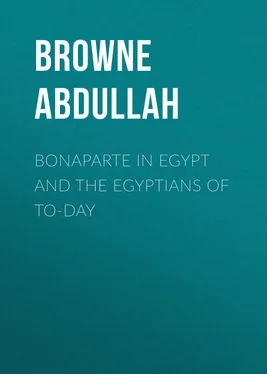Abdullah Browne - Bonaparte in Egypt and the Egyptians of To-day
Здесь есть возможность читать онлайн «Abdullah Browne - Bonaparte in Egypt and the Egyptians of To-day» — ознакомительный отрывок электронной книги совершенно бесплатно, а после прочтения отрывка купить полную версию. В некоторых случаях можно слушать аудио, скачать через торрент в формате fb2 и присутствует краткое содержание. Жанр: Историческая проза, foreign_antique, foreign_prose, foreign_language, на английском языке. Описание произведения, (предисловие) а так же отзывы посетителей доступны на портале библиотеки ЛибКат.
- Название:Bonaparte in Egypt and the Egyptians of To-day
- Автор:
- Жанр:
- Год:неизвестен
- ISBN:нет данных
- Рейтинг книги:4 / 5. Голосов: 1
-
Избранное:Добавить в избранное
- Отзывы:
-
Ваша оценка:
- 80
- 1
- 2
- 3
- 4
- 5
Bonaparte in Egypt and the Egyptians of To-day: краткое содержание, описание и аннотация
Предлагаем к чтению аннотацию, описание, краткое содержание или предисловие (зависит от того, что написал сам автор книги «Bonaparte in Egypt and the Egyptians of To-day»). Если вы не нашли необходимую информацию о книге — напишите в комментариях, мы постараемся отыскать её.
Bonaparte in Egypt and the Egyptians of To-day — читать онлайн ознакомительный отрывок
Ниже представлен текст книги, разбитый по страницам. Система сохранения места последней прочитанной страницы, позволяет с удобством читать онлайн бесплатно книгу «Bonaparte in Egypt and the Egyptians of To-day», без необходимости каждый раз заново искать на чём Вы остановились. Поставьте закладку, и сможете в любой момент перейти на страницу, на которой закончили чтение.
Интервал:
Закладка:
As soon as Ibrahim Bey heard the commencement of the battle he began to take such steps as he could to forward assistance to Murad Bey, but long before any effective move in that direction could be made the battle was over, and Ibrahim Bey, hearing of the flight of Murad, hastened back to Cairo with Bekir Pacha, to take their families and valuables and flee.
Words fail to describe the panic that overwhelmed the people. Utterly helpless, and unaccustomed to think or act for themselves, unarmed and without any possible means of defence, they saw themselves, deserted by their leaders, at the mercy of a foe from whom, as they thought, they could expect no quarter and no pity, while the military force, in the protection of which they had felt such unbounded confidence, was in full flight leaving them to their fate. To any unwarlike and helpless people to be thus suddenly abandoned as a prey to an unknown foe must have seemed an appalling disaster, but in this case no circumstance seems to have been wanting that could by any possibility add to the natural terror of the people at the calamity that had so suddenly befallen them. In less than an hour they were plunged from an exulting ecstasy of triumphant anticipation to the crushing despondency of the direst despair. The consternation that had been occasioned by the first news of the defeat of the Mamaluks at Shebriss had been largely, if not wholly, dissipated by the representations of the Mamaluks, and so loud and blatant were the vauntings of the people that Gabarty, whose Arab blood had but little sympathy for any open expression of the emotions, speaks in the most contemptuous terms of their conduct as wholly unworthy of a people deserving of any esteem. Nor had the Mamaluks, knowing well how little love the people bore them, neglected to contribute all they could to their fear of the French by attributing to these the lust of rapine and bloodthirsty cruelty. And with the news of the defeat and flight of Murad Bey came the tale of the slaughter of the Mamaluks by the riverside to confirm and augment the worst fears of the people. Later on reports were spread that the French were still busy slaying and destroying all before them, and, Ibrahim Bey having ordered the burning of all the boats to prevent the French using them to cross the river, the people, ignorant of this, took the dense columns of smoke arising from the riverside as confirmation of the ruthless ravage the French were said to be wrecking. In the dire madness of the despair that seized them no room was left for any other thoughts than those of self-preservation, and, as the evening closed in and night fell, the whole population, laden with all they could carry of their goods or wealth, streamed out of the city gates. In the maddened rush for safety, all the claims of blood and friendship were forgotten, and men and women alike, frantic from their fears, fought their way through the fleeing crowds heedless of parents, wives, brothers, sisters.
More than one writer has taken this wild exodus as a text to accuse the people of cowardice. Nothing could be more unjust. They were flying from what to them was a very real and immediate danger, and for the most part on foot from mounted foes. They could see no other choice but fly or die, and the darkness of the night, the suddenness of the danger, everything helped to urge them onward. Not more sure was Christian that he was fleeing from the City of Destruction than were they. It was a panic such as seizes a people with all the more uncontrollable force in that it comes as a sudden revulsion from peaceful ease; one such as those that in our own days in London, Paris, New York, and San Francisco have turned laughing, joyous crowds of pleasure-seekers into mobs of frenzied fugitives. When in the days of the dynamite scare in London the crash of the Scotland Yard explosion was heard in the Strand, men dashed here and there for safety from the danger that had passed. Not long after I saw a roomful of men hurl themselves headlong down a narrow flight of stairs, fleeing madly from the report of a detonating cigar! I have seen panic seize a thousand emigrants on board a German ship in mid-ocean; another, the pilgrims for Mecca on an Austrian ship in Bombay Harbour; another, the coolies working on the Hurnai Railway in Beloochistan. In these cases the panic-creating danger was an imaginary one, and yet in real danger these same victims of panic remained calm and collected. It was so, as we shall have occasion to see, with the unhappy Cairenes.
I have spoken already of the fears that the coming of the French had awakened in the hearts of the people, and to the Cairenes it must have seemed on that most miserable of nights as if the realisation of all the worst of those fears was but the question of a few moments. As the evening had fallen had they not seen the columns of flame-emblazoned smoke that to them were a proof of the ferocious fury of the foe? Had they not seen the Mamaluk Chiefs, the bravest of the brave, fleeing for life with breathless haste? With no arms, no leaders, nothing but instant flight as the only means of safety they could conceive, surely a people who had not been panic-stricken in such dire peril would have been a nation of heroes such as the world has never yet seen!
But if safety for them lay outside the city, it was not beneath its walls, for there the Bedouin tribesmen, whom Ibrahim Bey had summoned to assist him in the defence of the town, disappointed of the plunder of the French army to which they had looked forward as their only inducement to take part in the contest, with untroubled consciences turned to the pillage of the unhappy fugitives as a heaven-sent compensation for their unrealised hopes. Nor were they content with the rich plunder that thus easily fell into their hands, but with wanton savagery murdered the men and outraged and slew the women. Thus finding at the hands of their co-religionists, who had been summoned for their defence, no better mercy than the unrestrained cruelty they feared from the French, the unhappy people, or at least so many of them as escaped from the Bedouins, returned to their homes, while the Mamaluk Chiefs and their followers rode away through the desert indifferent to the fate of all they had left behind them.
Meanwhile the French army, after a short rest, had advanced along the left bank of the river as far as Ghizeh, a village lying in the line between the city and the pyramids, where Bonaparte decided to encamp. On their way from Embabeh the troops had an opportunity of seeing across the river the town of Cairo and the nearly mile-wide stretch of open land lying between, studded with the gardens and summer residences of some of the wealthier of the Beys. Elated by their victory, and perhaps still more so by the rich loot they had gleaned from the dead bodies of their fallen foes, they forgot the fatigues of their long advance, and set themselves to enjoy the rest they so much needed and the comparatively luxurious fare they expected to compensate them for all the hardships they had endured. Many were the castles that rose in the air as they sat around the bivouac fires, and joked and jested until, wearied by the labours of the day, "Nature's soft nurse" lulled them to the repose she withheld from their vanquished enemies.
Конец ознакомительного фрагмента.
Текст предоставлен ООО «ЛитРес».
Прочитайте эту книгу целиком, купив полную легальную версию на ЛитРес.
Безопасно оплатить книгу можно банковской картой Visa, MasterCard, Maestro, со счета мобильного телефона, с платежного терминала, в салоне МТС или Связной, через PayPal, WebMoney, Яндекс.Деньги, QIWI Кошелек, бонусными картами или другим удобным Вам способом.
Интервал:
Закладка:
Похожие книги на «Bonaparte in Egypt and the Egyptians of To-day»
Представляем Вашему вниманию похожие книги на «Bonaparte in Egypt and the Egyptians of To-day» списком для выбора. Мы отобрали схожую по названию и смыслу литературу в надежде предоставить читателям больше вариантов отыскать новые, интересные, ещё непрочитанные произведения.
Обсуждение, отзывы о книге «Bonaparte in Egypt and the Egyptians of To-day» и просто собственные мнения читателей. Оставьте ваши комментарии, напишите, что Вы думаете о произведении, его смысле или главных героях. Укажите что конкретно понравилось, а что нет, и почему Вы так считаете.












